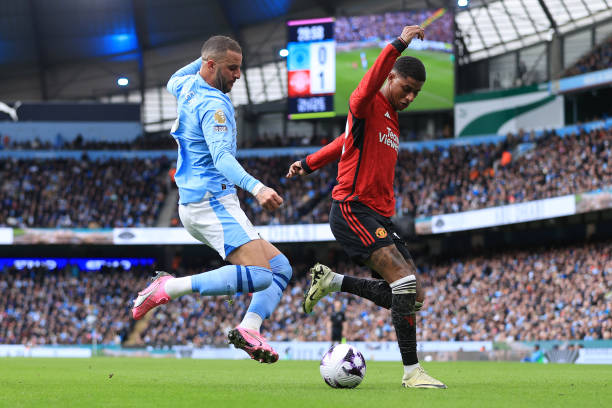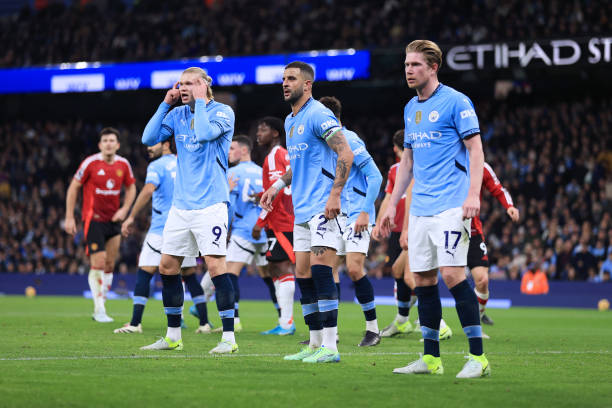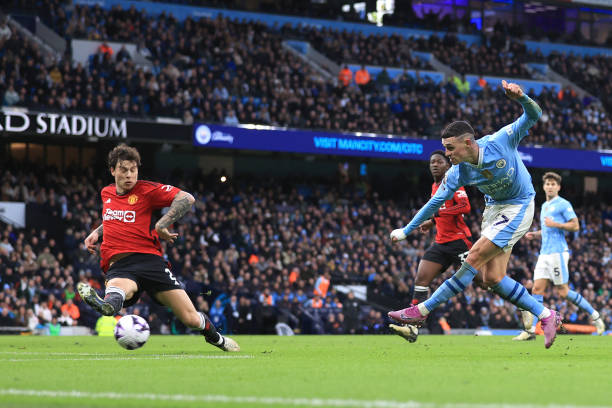Manchester City vs. Manchester United: An Iconic Battle
The Manchester Derby is one of the most passionate and hotly contested football rivalries in the world. It pits Manchester United against Manchester City. This derby is a match that represents the history, culture, and goals of two of the most illustrious football teams in England, not merely a struggle for local dominance. Over the years, the rivalry between the two teams has changed dramatically, with each side having its own distinct style, philosophy, and drama on the field, as well as times when it was dominant.
The History and the Rivalry’s Founding
The Manchester Derby’s history dates back to the late 1800s, when both teams were established in Manchester’s industrial district. Manchester City, formerly known as St. Mark’s, was founded in 1880, whereas Manchester United, formerly Newton Heath, was founded in 1878. But the competition didn’t really start to take shape until the 20th century.
At first, Manchester United dominated the city after winning several league titles and becoming one of the best teams in England. In contrast, Manchester City experienced inconsistent success, winning domestic cups but falling short in terms of consistency and international reputation.
Both teams were founded in the industrial area of Manchester in the late 1800s, which is where the Manchester Derby got its start. While Manchester United, previously Newton Heath, was established in 1878, Manchester City, formerly St. Mark’s, was established in 1880. However, it was not until the 20th century that the competition truly began to take shape.
After winning many league titles and rising to the top of the English football league, Manchester United first controlled the city. Manchester City, on the other hand, had patchy success, winning trophies at home but lacking in consistency and worldwide recognition.

Manchester United’s Ascent to Dominance
In the early 1990s, Sir Alex Ferguson led Manchester United into the contemporary age of their supremacy. Ferguson became United’s manager in 1986, and throughout his tenure, he turned the team into a major force in the world. United won many league titles, domestic cups, and European awards under his direction, including the storied Champions League victory in 1999.
Players like Eric Cantona, Ryan Giggs, Roy Keane, and eventually Cristiano Ronaldo became household names as a result of United’s success during this time, which was based on a mix of tactical genius, disciplined defense, and an exhilarating attacking style. Their position as the team to beat in Manchester and beyond was solidified by their supremacy in the Premier League in the 1990s and early 2000s.
The Rise of Manchester City as a Rival
The Abu Dhabi United Group, who acquired Manchester City in 2008, made a significant financial commitment that was crucial to the team’s ascent to fame. City was a mid-tier club before this ownership transition, but now they are among the richest and most competitive clubs in Europe. World-class players like Sergio Agüero, Yaya Touré, David Silva, and eventually Kevin De Bruyne were all drawn to the club by the financial infusion.
City started to threaten United’s hegemony in the Premier League and European tournaments under the leadership of Roberto Mancini, Manuel Pellegrini, and Pep Guardiola. Particularly under Guardiola, City’s style of play grew to be associated with fast passing, aggressive pressing, and possession-based football. Their accomplishment of winning several Premier, league championships, FA Cups, and other honors have established them as a serious contender to United’s heritage, especially in the contemporary period.
The 2010s and Afterwards: The Height of the Rivalry
Because City’s ascent mirrored United’s post-Ferguson era, which was marked by periods of instability and managerial changes, the Manchester Derby took on a new significance in the 2010s. With a last-minute goal from Sergio Agüero, Manchester City defeated United to win the Premier League title in dramatic fashion on the last day of the 2011–2012 season, marking the height of the fierce rivalry. This incident marked a sea change in the rivalry and the ascent of City to the top of English football.
The following seasons saw Manchester City continue to build on their success, winning more titles under Pep Guardiola, while United struggled to return to their former glory. City’s dominance was not just limited to the Premier League, but they also became regular contenders in the Champions League, further enhancing their status as one of the top clubs in Europe. Meanwhile, United, despite winning the 2016 FA Cup and 2017 EFL Cup, failed to challenge for the Premier League title with consistency, while also dealing with managerial turmoil.
The Effects of Important Players and Strategies
Important players have been crucial in determining the Manchester Derby’s results throughout the rivalry. Players like Wayne Rooney, Cristiano Ronaldo, and Roy Keane have been crucial for Manchester United in derbies, leading the team on the field and putting on game-winning performances. Ronaldo’s style and composure, along with Rooney’s iconic goals in derbies, helped solidify United’s supremacy in the rivalry.
However, Manchester City’s star players, especially during the Guardiola era, have displayed a distinct style of play, with players like Agüero, Raheem Sterling, and Kevin De Bruyne producing magical moments in crucial games. Agüero’s precision finishing makes him a constant danger, while De Bruyne’s passing range and vision have frequently determined the outcome of derby matches.

Using a solid defense, a dynamic midfield, and counterattacking play, Sir Alex Ferguson’s United sides frequently took use of the speed of players like Giggs and Rooney to outplay their opponents. City, under Guardiola, is focused on possession and establishing numerical advantage in strategic areas of the field. City’s ability to control the ball and set the pace has frequently irritated United, especially in recent meetings.
The Rivalry’s Present Situation
As of the 2020s, the Manchester Derby remains as fierce as ever. Manchester City, under Pep Guardiola, is one of the most successful clubs in Europe, dominating English football and consistently competing for top honors. United, on the other hand, is in the midst of rebuilding after the departure of Sir Alex Ferguson, with several managerial changes and a focus on bringing in younger, talented players.
However, despite City’s recent dominance, Manchester United still carries significant historical weight. The club remains one of the most supported and financially powerful teams globally. United’s current project, led by Erik ten Hag, aims to restore the club to its former glory, and the rivalry with City remains a key part of that journey.
Final Thoughts
The Manchester Derby is more than just a football match; it is a cultural event that captures the passion and intensity of the city itself. It represents the clash between two clubs with rich histories, distinct identities, and differing football philosophies. The rivalry has evolved over the years, from United’s dominance in the 20th century to City’s rise in the modern era. Despite City’s recent success, Manchester United remains a formidable force, and the derby is sure to continue captivating fans around the world for years to come. Whether it is a classic encounter that produces dramatic goals or a tense, tactical battle, the Manchester Derby will always hold a special place in the hearts of football fans.


